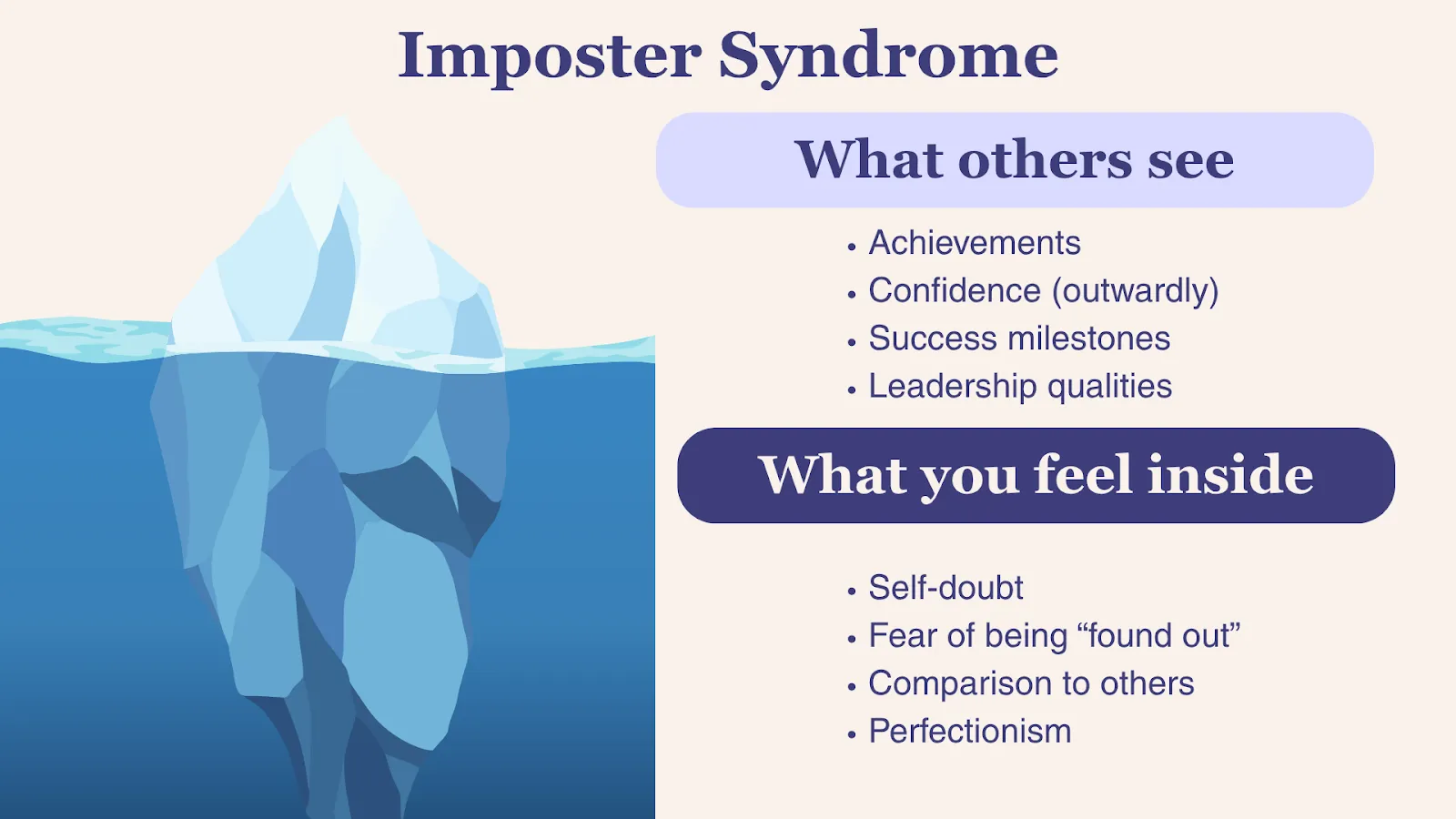Most of us experience moments of self-doubt. Maybe you downplay your achievements, chalking them up to luck, or worry that you’ll eventually be “found out.” These feelings are so common they’ve been given a name: Imposter Syndrome, also known as Imposter Phenomenon.
Imposter feelings aren’t tied to a particular stage of life or set of accomplishments. They can surface in school, relationships, creative pursuits, or any situation where you’re pushing yourself. The common thread is the sense that you don’t fully belong where you are—even when the evidence shows you do. These thoughts can feel overwhelming, but they don’t define your actual ability. More often, they reflect the pressure you’re under and the expectations you hold for yourself.
Before you read: We understand that the information and support we provide in this article may not be helpful for everyone. If you are in need of additional support or resources, please reach out to a professional, or connect with our team at contact@layla.care.
In this blog, we’ll cover:
- What Imposter Syndrome is and how it shows up
- Why so many people experience it
- Three strategies that may help ease imposter feelings
- A few takeaway reminders you can keep in mind
What Is Imposter Syndrome?
Imposter Syndrome (also known as Imposter Phenomenon) is a psychological experience that can make it feel like your success doesn’t fully belong to you—even when you’ve worked hard to earn it. Instead of recognizing your skills, effort, and growth, you might believe your achievements happened by chance, or because others overestimated you.
At its core, it’s the gap between how you see yourself and how others see you. You might:
- Doubt your ability to handle challenges, even with proof you’ve done it before.
- Fear being exposed as a “fraud” despite positive feedback.
- Believe success belongs to ‘real’ experts—not you.

These feelings can show up anywhere: at work, when you hold back from applying for a new role; in school, when you dismiss your academic achievements; or at home, when you worry you’re not a ‘good enough’ parent or partner. However they appear, the common thread is the sense that you don’t fully belong where you are, even though the evidence shows you do.
These thoughts can be overwhelming, but they don’t define your actual ability. They often arise from a mix of internal and external pressures such as the high expectations you set for yourself, early messages about success, and the expectations or stereotypes present in your environment. Over time, these influences can shape how you see your competence, but with awareness and support, you can begin to recognize your success as something you’ve genuinely earned.
Why Does Imposter Syndrome Affect So Many People?
Imposter feelings often show up when you’re stepping into something new, high-pressure, or important. They can be especially strong if you set high standards for yourself or if you’re in environments where comparison is constant.
Here’s what makes Imposter Syndrome even trickier:
- The qualities that help you succeed, such as ambition, persistence, and a drive for excellence, can also fuel self-doubt.
- The more you accomplish, the louder imposter thoughts can become, because each new success feels like another chance to be “found out.”
Context matters too. If you’re underrepresented in your field, the pressure to prove yourself can feel even heavier, even when you’re just as qualified as your peers. In competitive environments, it’s easy to compare yourself unfairly and come up short. And in cultures that celebrate perfectionism, it can feel like nothing you do is ever enough.
Knowing this doesn’t make the feelings disappear, but it can remind you: you’re not alone. Imposter Syndrome is common, and it’s not a sign you’re failing, it’s often a sign you’re growing.
Three Strategies to Work Through Imposter Feelings
There isn’t a one-size-fits-all way to address Imposter Syndrome, but there are steps that can help you feel more grounded and confident over time. Here are three you might find helpful:
1. See It as a Shared Experience
Imposter thoughts can feel isolating, but you’re not alone in them. Simply naming what’s happening—‘This is Imposter Syndrome’—can help you step back from the thought. Opening up with peers or mentors often shows they’ve felt the same way, which can ease the pressure and soften the worry.
2. Use Your Body to Calm Your Mind
The way you hold your body affects how you feel. When imposter thoughts show up, pause and check in: Are your shoulders tight? Is your breath short? Try rolling your shoulders back, softening your jaw, and taking a slower exhale. These small shifts can send calming signals to your brain and give your mind more space to think clearly.
3. Notice and Gently Challenge Self-Talk
When your inner critic says, ‘I’m not good enough,’ try writing it down and labeling it for what it is: a thought—not a fact. Some people find it helpful to repeat the word that stings (‘fail,’ ‘fraud’) until it softens. From there, try offering yourself a kinder truth: “I’m learning as I go, and that’s enough.”
Layla’s Takeaway Tips
Working through imposter feelings takes practice, and it’s normal to need reminders along the way. To make it easier, we’ve gathered a few takeaways you can return to whenever those thoughts creep in. Think of them as gentle anchors—small truths you can hold onto when self-doubt feels heavy.
- Imposter Syndrome is common—experiencing it doesn’t mean you’re failing.
- Naming your imposter thoughts can give you distance from them.
- You’re not alone—many people share these same feelings, even if they don’t always talk about them.
- Gentle shifts in your body, like slowing your breath or relaxing your shoulders, can help your mind feel calmer.
- Reframing harsh self-talk into gentler truths supports long-term confidence.
A Message from Layla
If you require any immediate support, please reach out to a professional, or click here to explore our crisis and community resources. If you’d like to inquire about finding mental health support that’s right for you, a member of our team is happy to assist you. You can email us at contact@layla.care for any inquiries, or complete our intake form to reach out to a member of our care team.





